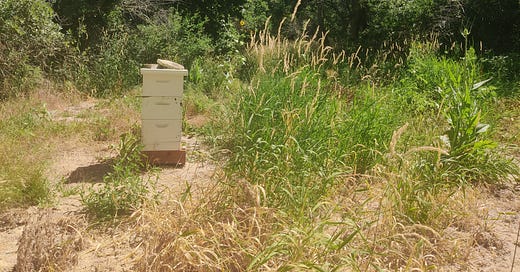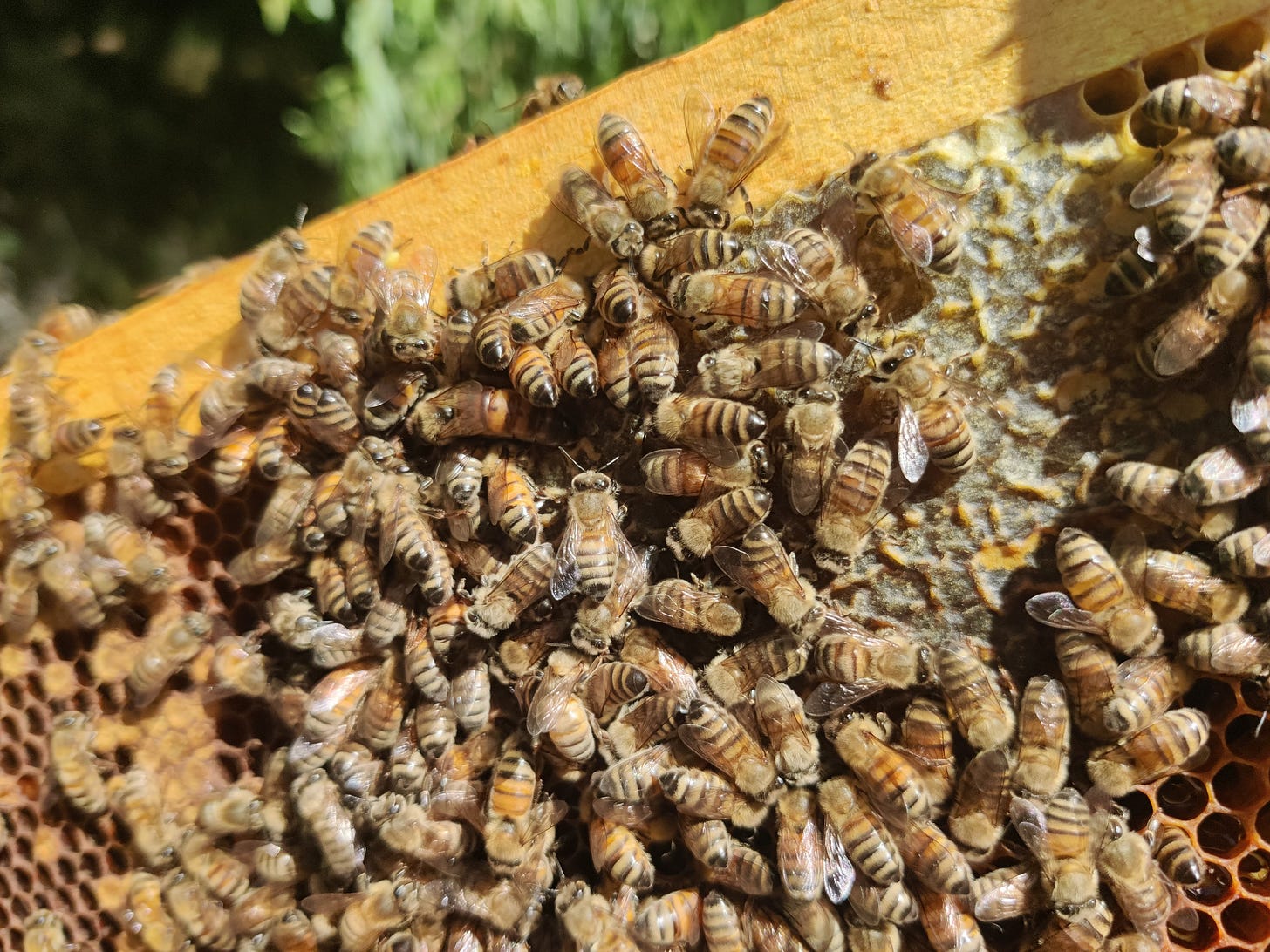I really don't have a title for this one.
just some words on soccer practice, honey harvest, old boyfriends, and expert bias while I get my writing feet under me again.
I’ve been at a bit of a loss for words the last two or three weeks. Rather, I’ve been in a state of absorption and processing. Different thoughts have been roaming around my head and my heart, looking for a corner into which they can settle. Thoughts about the importance of context in a relationship or an interaction, and expectations and why they are important. Thoughts about time and how one should use it, and what does “wasting” it actually look like. Thoughts about living simply and gently, but also boldly and fiercely. They haven’t settled yet, though, so I find myself with little to write about. This last week has been less about thoughts and more about survival–having five sick children and a sick husband can really throw everything off kilter. I’m writing today simply to hold onto the last shreds of momentum that I may still have, an attempt to avoid putting writing away for months, as it often happens.
I stumbled upon a social media post last week about a beekeeper that, while collecting frames to harvest honey, came across a bee that had become covered in the sticky sweetness and was struggling. The beekeeper gently returned the bee to the entrance of the hive, where her sisters quickly got to work cleaning her up. I love bees, in all their gentleness and ferocity. I was astounded, however, at the comments on this post. Lots of people with lots of opinions, many quite ignorant or misinformed about honey bees and beekeeping.
It reminded me of my son’s soccer coach. It’s my boy’s first season. I have…opinions…about organized sports for children, but I do try to keep them to myself for the most part. He has a friend that plays and so was keen to try it out, so here we are. I have my reasons for being less than a fan of organized sports, but I know others have very legitimate reasons for loving them. Anyway, the coach told the boys at the first practice that he has coached high school and competitive teams, so hopefully he can teach them something worthwhile (they are 8 and 9 years old). And then he starts talking about inside and outside and offsides, saying things like “all our offense starts with our defense”, and using soccer vocabulary that my first-season son has never heard in his life. Which would be fine and understandable, but then the coach is always getting upset when the boys don’t perform well. His instructions are confusing, his descriptions are elaborate, and all the boys, mine included, have a hard time focusing and listening because it doesn’t make sense. And it’s not fun. It’s more fun to goof off together.
I had a friend describe this situation to me as “expert bias.” Because the coach has spent years and years with soccer and knows just about everything there is to know, it’s extremely difficult to comprehend why someone else wouldn’t know those things. It’s hard to peel back your own experience far enough to see the other person’s experience, or lack thereof. To refrain from projecting your experience onto theirs, from infusing their story with the flavor of yours, but to let it be theirs, completely separate from yours, and to be able to then communicate with them in a way that they can understand.
When I was twenty years old, I found myself in a relationship with a person that I never would have expected, and I’m sure none of my family or friends did, either. I was a young, naïve, hopeful girl, considering serving a proselytizing mission for the church I belong to, living with my grandmother, having led a sheltered life, though not wholly unacquainted with sorrow, grief, and loss. He was a 27-year-old veteran, covered in tattoos up to his chin and recovering from addiction, brooding and cynical but genuinely searching for light and happiness, and willing to work for it. We worked together at my uncle’s gutter installation business, me in the office, him in the field. We were friends first, but not for long. I didn’t think I was the kind of person he would even notice. His attention was surprising. It made me feel grown up.
I know better now. I know I had no business being anything other than a friend. I didn’t know what the twelve steps were, I didn’t know that he wasn’t supposed to engage in a relationship yet. And when I learned, I thought we were the exception. I thought I was helping. I thought I was someone sturdy to hold onto. It’s a bit embarrassing, looking back and realizing just how naive I really was. I let him into my life and he caused damage everywhere he went, but he also said nice things to me and replaced the tires on my car when I couldn’t afford to. He treated me like I was the most amazing woman (not girl) he’d ever known.
Until he didn’t; until he started to project onto me his past experiences. Until he decided I was like the rest of the people that disappointed him, and interpreted everything I said and did to fit into that mold. He poisoned my other friendships, he verbally and emotionally abused me, he made me feel stupid and worthless. And then he apologized and did something sweet to make up for it. He wanted me to marry him. I was still thinking about that mission for my church, and he said he would wait for me if I decided to go. So, I decided to go. And he was furious. He said he thought what we had was more important to me.
He dropped me so fast and so viciously, I had mental and emotional whiplash. It took me years to get over the way he treated me and the way he made me feel. Years and years. I think there are still scars from the bite of his words and the sting of his actions. I went on that mission after all, and I’m so grateful that I did. Not in the least because it’s where I met my husband. Sometimes I imagine what life would have been like for me if I had stayed with that man, that golden-eyed veteran. We really did have some wonderful times. But I’m almost certain that the emotional abuse would have devolved into physical abuse. He was more haunted than I realized, and I was not helping, despite what I believed. His past, and the people and experiences that lived there, so colored his perception of the present, and of me, that he couldn’t see it plainly.
I think I’ve done that same thing to people in my life, though perhaps not as dramatically as he did. I think that I’ve lived so deeply and singularly in my own experiences that it’s difficult to comprehend why others behave the way they do. Don’t they know? Can’t they see? Shouldn’t they realize how their actions are affecting me? How could they miss this detail or that? I think it’s safe to say that I have a pretty hefty expert bias on my own mind and heart, and I suspect I have unfairly used that bias in the way I’ve interacted with others.
This isn’t to say that what may have been done or said didn’t hurt. But, it’s rather like those commenters who insist that all bees are male, except the queen. The reality is that all of the worker bees in a honey bee colony are female. The only males are the drones, and they have one purpose (to mate). They do not forage, they do not protect the hive, they do not nurse baby bees, they do not tend the queen. They eat and they mate. I can get all up in arms about how ridiculous those commenters are, how ignorant and silly they are. Or I can shrug my shoulders, remind myself that they are not beekeepers or entomologists, so it’s understandable that they wouldn’t understand the complexities of a beehive. I can try to teach and inform them, but I can’t force them to understand.
This metaphor is getting rather drawn out; what I am getting at is that I’m learning to be able to recognize my expert biases, and to resist projecting them onto those around me. It is, gradually, easing some strain on my heart and allowing me a tighter grasp on the grace I have been seeking to extend to others. While the spines of some words are harder to dislodge from my heart than others, I think I can accept that there is, indeed, no venom in them after all.
Speaking of bees, I am gearing up for my first ever honey harvest. Last year was my first year beekeeping, and there was some real drama with my queen at the end of the season, so I left all the honey for the bees to try and get them through the winter. Winter was about six or eight weeks longer than it usually is here, and they didn’t survive after all. My new hive has been flourishing this year, and I’m so pleased. I am still very much a novice, but I do love it. It’s just one hive, just one box, so there won’t be loads of honey. But I’m so excited to use it in my tea this winter; how lovely will that be?






" covered in tattoos up to his chin and recovering from addiction"
I feel I should mention that these are not metrics by which I choose to judge anyone; I have the utmost respect for recovering addicts and know better than to jump to conclusions about a person based on appearance (though sometimes I do, and am working on being more generous). These things, in the town I grew up, though, were very much taboo and my involvement with this man, had we been in my hometown, would have been unbelievable. He seemed very exotic to me.
'came across a bee that had become covered in the sticky sweetness and was struggling. The beekeeper gently returned the bee to the entrance of the hive, where her sisters quickly got to work cleaning her up.'
Now that's some community! A big fan of those bee people. And tea honey is coming; good for you! Sounds like your crew be needing some hot tea, rest when you can!